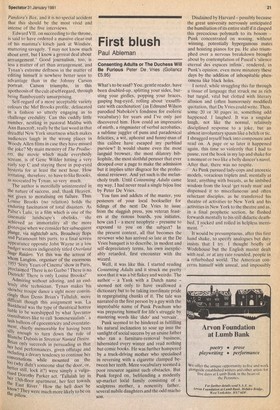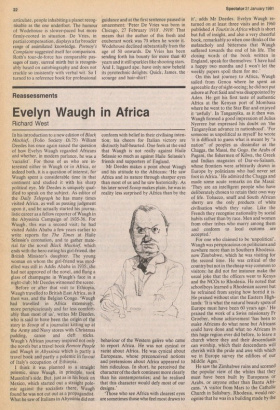First blush
Paul Ableman
Consenting Adults or The Duchess Will Be Furious Peter De. Vries (Gollancz £5.95) What's to be said? You, gentle reader, have been doubled-up, splitting your sides, bursting your girdles, popping your braces, gasping bug-eyed, rolling about 'exsufflicate with cacchination' (as Edmund Wilson parodied NabokOv's fondness for esoleric vocabulary) for years and I've only just discovered him. How could an impresario of mirth, a ringmaster of verbal acrobatics, a sublime juggler of puns and paradoxical felicities, a wit, aphorist and funny-man of this calibre have escaped my purblind purview? It would shame even the most Languid browser, the most dilatory bibliophile, the most slothful peruser that ever drooped over a page to make the admission but it implies utter disgrace for the professional reviewer. And yet such is the melancholy truth. Until Consenting Adults came my way, I had never read a single bijou line by Peter De Vries.
You fans and addicts of the master, you pesterers of your local bookseller for tidings of the next De Vries to issue from the sluggish press, you veteran feasters at the riotous boards, you initiates, how can I a mere neophyte presume to expound to you on the subject? In the present context, all that becomes the reviewer who has arrived so late at the De Vries banquet is to describe, in modest and self-depreciatorY terms, his own inexplicably retarded, first encounter with the wizard.
Well, it was like this. I started reading Consenting Adults and it struck me pretty soon that it was a bit flakey and weirdo. The author a Yank with a Dutch name seemed not only to have swallowed a dictionary but to be taking inordinate pride in regurgitating chunks of it. The tale was narrated in the first person by a guy with the improbable name of Punk Peachum who was preparing himself for life's struggle by mastering words like adido' and 'vervain'.
Punk seemed to be hindered in fulfilling his natural inclination to soar up into the sunlight of social success by an ursine father who ran a furniture-removal business, hibernated every winter and read nothing but comic books. He was further hampered by a truck-driving mother who specialised in reversing with a cigarette clamped between her teeth. Mere vocabulary seemed a poor resource against such obstacles. But Punk forged on, befriending a modestly up-market loeal family consisting of a sculptress mother, a nonentity father, several nubile daughters and the odd macho son. Disdained by Harvard possibly because the great university nervously anticipated the humiliation of its entire staff if it clasped this precocious polymath to its bosom Punk concentrated on wooing, without winning, potentially hypergamous mates and hoisting pianos for pa. He also triumphed over a nervous breakdown brought about by contemplation of Pascal's 'silence eternal des espaces infinis'„ rendered, in Punk's opinion, even more minatory these days by. theaddition of inhospitable phenomena like black holes.
I noted, while struggling this far through a tissue of language that struck me as rich but turgid, vital but clotted with literary allusion and (often humorously modified) quotation, that De Vries could write. Then, some 20 or 30 pages in, something odd happened. I laughed. It was a singular laugh, not like the normal, relatively disciplined response to a joke, but an almost involuntary spasm like a belch or tic. I shrugged myself back into composure and read on. A page or so later it happened again, this time so violently that I had to pause, rest the book in my lap and shake for a moment or two like a belly dancer's navel. After that, there was no respite.
As Punk pursued lady-cops and anorexic models, voracious triplets and, mentally at least, anything with breasts, as he imbibed wisdom from the local 'get ready man' and dispensed it to miscellaneous and often reluctant disciples, as he transferred his theatre of activities to New York and his activities in New York to the theatre and as: in a final prophetic section, he flashed forwards mentally to his still didactic deathbed, I rocked and rolled in helpless merriment.
It would be presumptuous, after this first hand shake, to specify analogues but duty insists that I try. I thought briefly of Wodehouse but the English master dealt with real, or at any rate rounded, people in a refurbished world. The American concerns himself with unreal, and impossibly articulate, people inhabiting a planet recognisable as the one underfoot. The humour of Wodehouse is slower-paced but more firmly-rooted in situation. De Vries, in partial compensation, displays a far broader range of assimilated knowledge. Portnoy's Complaint suggested itself for comparison. Roth's tour-de-force has comparable passages of zany, surreal mirth but is recognisably based on autobiography and does not crackle so insistently with verbal wit. So I turned to a reference book for professional guidance and at the first sentence paused in amazement: 'Peter De Vries was born in Chicago, 27 February 1910'. 1910! That means that the author of this fresh and exuberant work was 70 when he wrote it. Wodehouse declined substantially from the age of 50 onwards. De Vries has been sending forth his bounty for more than 40 years and it still sparkles like shooting stars. And 1, laggard ape, have only now beheld its pyrotechnic delights. Quick, James, the scourge and hair-shirt!







































 Previous page
Previous page